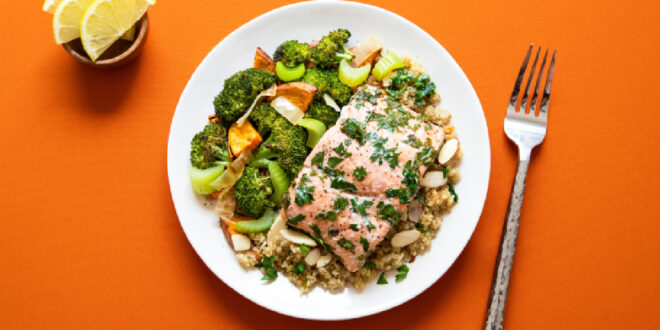Maintaining a high-protein diet is essential for muscle development, healthy metabolism, and overall well-being. While many assume that a protein-rich diet is difficult for vegetarians to follow, the truth is quite the opposite. There is a wide array of plant-based protein sources that are not only rich in nutrients but also easily accessible and delicious.
In this comprehensive blog, we will dive deep into Wellhealthorganic High Protein Rich Food For Vegetarians To Boost Your Health, highlighting the top vegetarian sources of protein, their health benefits, and how to incorporate them into your daily meals.
Why Protein Is Important
Protein is the building block of life. From muscles and skin to enzymes and hormones, almost every part of your body needs protein to function. For vegetarians, getting the right amount of protein ensures:
- Healthy muscle growth
- Improved metabolism
- Strong immune system
- Balanced blood sugar levels
- Sustained energy throughout the day
Contrary to myths, vegetarians can meet their protein needs with ease—if they know what to eat.
How Much Protein Do You Need?
The Recommended Dietary Allowance (RDA) for protein is:
- 0.8 grams per kilogram of body weight for sedentary adults
- 1.2–2.0 grams per kilogram for active individuals or athletes
For instance, a 60-kg adult woman would need around 48 grams of protein daily, while an active person might need closer to 70–100 grams.
This makes choosing high-quality vegetarian protein sources even more critical.
Top High-Protein Foods for Vegetarians
Let’s explore the Wellhealthorganic High Protein Rich Food For Vegetarians To Boost Your Health and how each food item can fit into your daily diet.
1. Lentils (Dal)
Protein Content: ~18 grams per cooked cup
Lentils are a staple in many Indian households. They are not only rich in protein but also fiber, iron, and folate.
Health Benefits:
- Promotes heart health
- Helps with weight management
- Regulates blood sugar levels
How to Use:
Include lentils in dals, soups, salads, and even patties.
2. Chickpeas (Chana)
Protein Content: ~15 grams per cooked cup
Chickpeas are incredibly versatile and packed with protein, fiber, and manganese.
Health Benefits:
- Supports digestion
- Promotes bone health
- Aids in blood sugar control
How to Use:
Make hummus, chana masala, or add them to salads and Buddha bowls.
3. Quinoa
Protein Content: ~8 grams per cooked cup
Quinoa is a complete protein, meaning it contains all nine essential amino acids. It’s also gluten-free.
Health Benefits:
- Good for metabolism
- High in antioxidants
- Boosts brain function
How to Use:
Substitute rice with quinoa, or make quinoa salads and upma.
4. Tofu and Tempeh
Protein Content:
- Tofu: ~10 grams per ½ cup
- Tempeh: ~15 grams per ½ cup
Made from soybeans, tofu and tempeh are protein-rich and calcium-fortified.
Health Benefits:
- Improves bone strength
- Reduces cholesterol
- Contains isoflavones for hormone balance
How to Use:
Add to stir-fries, curries, wraps, or grill them as snacks.
5. Greek Yogurt
Protein Content: ~10–20 grams per cup
Greek yogurt is thicker and has more protein than regular yogurt.
Health Benefits:
- Supports gut health
- Boosts immunity
- Rich in calcium
How to Use:
Have it plain, mix in fruits, or use it as a base for smoothies and dips.
6. Nuts and Seeds
Protein Content:
- Almonds: 6 grams per ounce
- Pumpkin seeds: 7 grams per ounce
- Chia seeds: 5 grams per 2 tablespoons
These are small but mighty when it comes to protein, fiber, and healthy fats.
Health Benefits:
- Enhances brain function
- Promotes heart health
- Provides sustained energy
How to Use:
Sprinkle them on smoothies, oats, yogurt, or eat them raw/roasted.
7. Edamame (Boiled Soybeans)
Protein Content: ~17 grams per cup
A rich source of complete plant protein, edamame is perfect for snacks or salads.
Health Benefits:
- Improves cholesterol profile
- High in antioxidants
- Promotes muscle repair
How to Use:
Boil and season as a snack, or mix into rice bowls.
8. Cottage Cheese (Paneer)
Protein Content: ~14 grams per 100 grams
Paneer is a protein powerhouse for vegetarians and is also rich in calcium.
Health Benefits:
- Strengthens bones
- Helps with satiety
- Builds muscle
How to Use:
Add to curries, make paneer bhurji, or grill for healthy tikkas.
9. Oats
Protein Content: ~6 grams per cup (cooked)
Oats are not just about fiber—they pack in a decent amount of protein too.
Health Benefits:
- Reduces cholesterol
- Supports weight loss
- Improves heart health
How to Use:
Prepare oatmeal, overnight oats, or oats upma.
10. Green Peas
Protein Content: ~9 grams per cup
Often underestimated, green peas are protein-rich and high in vitamins.
Health Benefits:
- Supports immune function
- Aids digestion
- Good for skin and eyes
How to Use:
Add to pulao, sabzi, or mash into cutlets.
Tips for Boosting Protein Intake
If you’re wondering how to optimize your diet using these protein sources, here are a few practical tips:
- Combine different protein sources – Mix lentils, grains, and dairy for a complete amino acid profile.
- Include protein in every meal – Don’t rely only on dinner. Add nuts, seeds, or dairy during breakfast and lunch.
- Use protein-rich flours – Try besan, soy flour, or buckwheat instead of refined wheat flour.
- Add seeds to everything – Sprinkle chia or hemp seeds over your meals.
- Use protein supplements if needed – If you’re active or bodybuilding, consult a dietician about plant-based protein powders.
Sample High-Protein Vegetarian Meal Plan
Here’s a simple vegetarian meal plan using Wellhealthorganic High Protein Rich Food For Vegetarians To Boost Your Health:
Breakfast
- Greek yogurt bowl with fruits and chia seeds
- 1 multigrain toast with almond butter
Mid-Morning Snack
- Roasted chickpeas or a handful of mixed nuts
Lunch
- Quinoa pulao with vegetables and tofu
- Cucumber and edamame salad
Evening Snack
- Smoothie with oats, banana, and protein-rich soy milk
Dinner
- Mixed dal with brown rice
- Paneer bhurji with sautéed spinach
- Green peas soup
Why Wellhealthorganic Recommends These Protein Foods
The team at Wellhealthorganic emphasizes whole, natural, plant-based nutrition for long-term wellness. Each food item in this list is selected based on its:
- Nutrient density
- Ease of digestion
- Availability
- Versatility in Indian and global cuisines
By following the guide on Wellhealthorganic High Protein Rich Food For Vegetarians To Boost Your Health, you’ll not only increase your protein intake but also enhance your overall nutritional profile.
Conclusion
Protein is a cornerstone of good health, and vegetarians can absolutely thrive on a plant-based high-protein diet. With foods like lentils, tofu, quinoa, yogurt, and seeds, you can easily meet your protein needs while enjoying a diverse and delicious menu.
By focusing on Wellhealthorganic High Protein Rich Food For Vegetarians To Boost Your Health, you take a proactive step toward energy, strength, and holistic well-being—without compromising your dietary choices.
 Well Health Organic
Well Health Organic




